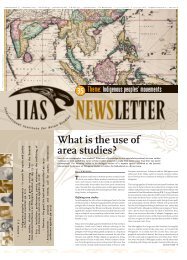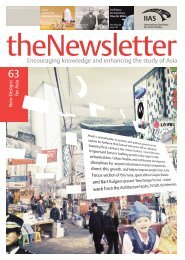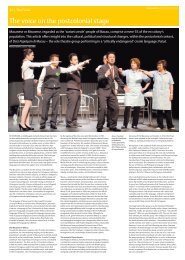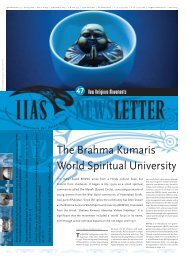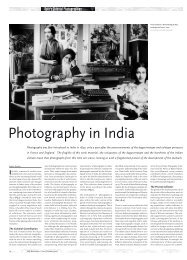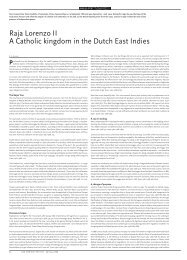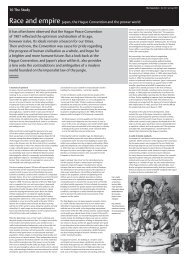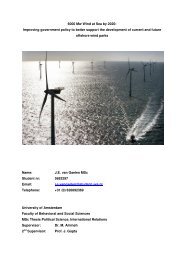Sex, love and revolution - IIAS
Sex, love and revolution - IIAS
Sex, love and revolution - IIAS
Create successful ePaper yourself
Turn your PDF publications into a flip-book with our unique Google optimized e-Paper software.
T H E M E W o m e n W a r r i o r s<br />
Former combatants are usually dealt with through the Disarmament, Demobilisation <strong>and</strong> Reintegration (DDR) processes.<br />
Historically the emphasis has been on the disarmament <strong>and</strong> demobilisation of male soldiers, since armed men are regarded<br />
as a potential threat to peace <strong>and</strong> security. In developing countries, however, women play multiple roles in armed conflict,<br />
including as armed combatants. Yet women who have carried arms are rarely included in DDR arrangements, <strong>and</strong> they tend to<br />
just disappear at the end of a war, deriving no benefit from processes intended to care for the needs of ex-combatants <strong>and</strong> ensure<br />
national security.<br />
The aftermath for women warriors:<br />
Cambodia <strong>and</strong> East Timor<br />
Susan Blackburn<br />
In both East Timor <strong>and</strong> Cambodia, where<br />
I conducted research with Oxfam Australia<br />
in 2005-6, 1 the United Nations (UN)<br />
played an important role in ending armed<br />
conflict, <strong>and</strong> its intervention helped shape<br />
the post-conflict arrangements in each<br />
country. Because both countries were<br />
devastated, international assistance was<br />
essential for their reconstruction. Aid<br />
donors have therefore had great influence.<br />
The question posed here is have they had<br />
any impact on women’s involvement in<br />
DDR?<br />
Cambodia<br />
In Cambodia in the 1990s, the process<br />
of disarming <strong>and</strong> demobilising troops,<br />
including those of the Khmer Rouge, was<br />
messy, fragmented <strong>and</strong> prolonged. The<br />
Paris Peace Agreements of 1991 created<br />
the United Nations Transitional Authority<br />
in Cambodia (UNTAC) which was supposed,<br />
among other duties, to supervise<br />
the ceasefire <strong>and</strong> arrange for the disarming<br />
<strong>and</strong> demobilising of all armed groups.<br />
However, lack of cooperation from the<br />
Cambodians meant that UNTAC was unable<br />
to carry out this task properly. Although<br />
about 36,000 fighters were demobilised by<br />
1993, the Khmer Rouge continued recruiting<br />
<strong>and</strong> fighting. International funds were<br />
supplied for DDR which finally began in<br />
1997 but was suspended after the coup<br />
that year <strong>and</strong> did not resume until 2000.<br />
The internationally funded programme<br />
provided h<strong>and</strong>outs in 2001 to soldiers who<br />
were demobilised. 2 I have not been able to<br />
find any reference to women soldiers in the<br />
documentation about the official demobilisation<br />
process, although the Khmer Rouge<br />
were noted for their recruitment of women<br />
(<strong>and</strong> child soldiers). 3 Female Khmer Rouge<br />
ex-combatants attempted to remake their<br />
lives in any way they could. In this respect<br />
the aftermath of fighting in Cambodia<br />
probably resembled that of most poor<br />
countries throughout history. That women<br />
were neglected did not differentiate them<br />
from most men.<br />
Nowadays, no glory attaches to the Cambodian<br />
conflict. The whole period of the<br />
1970s to 1990s is a bleak one in Cambodian<br />
history <strong>and</strong> there has been no celebration<br />
of victors <strong>and</strong> very little punishment<br />
of losers. Pol Pot <strong>and</strong> Ieng Sary were tried<br />
in absentia in 1979 in Phnom Penh <strong>and</strong><br />
sentenced to death, <strong>and</strong> an international<br />
criminal trial of a few remaining Khmer<br />
Rouge leaders, long postponed, is now<br />
being held. Our interviews in rural areas<br />
suggest it is better to avoid talking about<br />
Two ex-combatant women in Takeo province, Cambodia. Often former combatant women do not want to be photographed following the conflict, in particular if they were on the losing side.<br />
Photographs courtesy of the author.<br />
any participation in the hated Pol Pot<br />
regime. On the other h<strong>and</strong>, most Cambodians<br />
avoid blaming people who served<br />
that government, on the grounds that they<br />
were forced to obey.<br />
“Some people think we are not<br />
good women”<br />
In 2005, when I asked the Cambodian staff<br />
of Oxfam Australia <strong>and</strong> their provincial<br />
government counterparts about the existence<br />
of women ex-combatants in the rural<br />
areas where they worked, most denied<br />
knowing of any. One counterpart in Takeo<br />
province agreed that there probably were<br />
female ex-combatants in the area where<br />
he worked, “but they do not want to let<br />
us know. They prefer to keep it secret as<br />
it may affect their status because people<br />
discriminate against former Khmer Rouge<br />
soldiers”. Those who mentioned knowing<br />
of such women clearly regarded them as<br />
exceptional cases. At the village level in<br />
Takeo province, however, people readily<br />
acknowledged that there were women excombatants<br />
living in their midst. They did<br />
not hold any grudges against them, probably<br />
because any violence in which they had<br />
been involved had been committed elsewhere,<br />
but also because of the widespread<br />
view that people were forced to commit<br />
such acts by the Khmer Rouge: “They had<br />
no choice” was the frequent refrain.<br />
Our enquiries revealed no particular difficulties<br />
facing women ex-combatants in<br />
settling back into the community. Some<br />
now participated in community development<br />
projects. Two female ex-combatants<br />
we interviewed in Takeo province said they<br />
suffered no discrimination although one<br />
mentioned “there are rumours that some<br />
people think we are not good women”.<br />
In the aftermath of any war, the health<br />
problems of ex-combatants may be quite<br />
serious, particularly if they were injured<br />
during duty, or if they suffer conflictinduced<br />
trauma. The female ex-combatants<br />
we heard about or interviewed in Cambodia<br />
were in poor health. Many who were<br />
recruited as teenagers during the conflict<br />
had no opportunity to gain an education.<br />
Ill health <strong>and</strong> lack of education are, however,<br />
experienced by most who survived that<br />
period <strong>and</strong> it is difficult to warrant singling<br />
out Cambodian ex-combatants for special<br />
treatment. The fact that many of their<br />
problems are shared by non-combatants is<br />
in some ways an advantage since it means<br />
there is likely to be more sympathy <strong>and</strong><br />
support, which is particularly important in<br />
such matters as post-conflict trauma. In<br />
this respect the situation is very similar to<br />
that in East Timor.<br />
East Timor<br />
Compared with Cambodia, although East<br />
Timor also suffered great poverty <strong>and</strong><br />
destruction, more attention was paid to<br />
women in that country after 1999. In part<br />
this is accounted for by the different nature<br />
of the armed conflict there: the struggle for<br />
independence against Indonesian rule is<br />
heroic. Also, by the time of UN intervention<br />
in East Timor, international thinking<br />
on gender <strong>and</strong> conflict had developed further<br />
than during the Cambodian intervention.<br />
But progress has been slight, <strong>and</strong> the<br />
problems of identifying combatants in a<br />
guerrilla war remain.<br />
Women combatants may learn some skills<br />
that will assist them in future life, most<br />
notably courage, confidence, contacts <strong>and</strong><br />
leadership. In Cambodia, the ex-combatants<br />
we interviewed remembered only<br />
their own bravery <strong>and</strong> resilience with any<br />
degree of positive sentiment when they<br />
recollected the war years. In the case of<br />
East Timor, in contrast, there is leadership<br />
value in having been an ex-combatant:<br />
they are generally highly regarded <strong>and</strong><br />
st<strong>and</strong> a good chance of being elected to<br />
the many positions opening up in East<br />
Timor’s new democratic society. However,<br />
women have been unable to share in the<br />
assistance given to some of their male<br />
colleagues who bore arms. As part of the<br />
DDR programme, some former liberation<br />
fighters have been incorporated into the<br />
new national security forces <strong>and</strong> others<br />
have received cash <strong>and</strong> training to help<br />
them settle back into society. No women<br />
have enjoyed these privileges. 4<br />
Unlike in Cambodia, in East Timor people<br />
at all levels were generally prepared to talk<br />
to us about women’s role in armed conflict.<br />
The exceptions were some villages<br />
in Covalima, East Timor’s south-eastern<br />
province bordering the Indonesian part<br />
of the isl<strong>and</strong>, which had been dominated<br />
by the pro-Indonesian militias: there some<br />
people resented discussing the conflict.<br />
It was a reminder that women might also<br />
1 4<br />
I I A S N E W S L E T T E R # 4 8 S u m m e r 2 0 0 8



